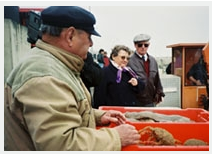Poll reveals public demand for sea change in EU fisheries
An opinion poll released today to mark World Fisheries Day reveals that more than 90 percent of people surveyed in the UK are concerned that overfishing is having a serious impact on the health of the seas – and want the government to do more to prevent it. The poll reveals that over 80 percent of UK respondents agree that EU fisheries ministers should set targets that minimise the risk of stock collapse and environmental harm while increasing the long term social and economic benefits to fisheries dependent communities.
According to the European Commission, more than 70 percent of assessed European fish stocks are overfished with 20 percent being fished beyond safe biological limits. For 14 percent of the stocks there is advice to urgently close the fishery.

“This poll is an indictment of EU fisheries ministers’ failure to prevent overfishing. Eight out of ten people surveyed believe decision-makers have endangered the health of the oceans, and in so doing, the well-being of future generations,” said Aniol Esteban of OCEAN2012 and nef (the new economics foundation).
The poll comes ahead of two key meetings of EU Fisheries Ministers at the end of November and in mid December, when they will be deciding the 2011 European fishing quotas. The poll shows that an overwhelming majority of those surveyed want the UK Fisheries Minister, Richard Benyon MP, to take action to ensure depleted fish stocks are restored.
Eight out of ten people surveyed believe decision-makers have endangered the health of the oceans, and in so doing, the well-being of future generations. Aniol Esteban of OCEAN2012 and NEF (the New Economics Foundation)
“If ministers really want to serve their national interest they need to stop negotiating with nature and livelihoods,” continued Esteban. “Richard Benyon has the opportunity to make this happen by supporting scientific advice and rewarding responsible fishermen with access to resources.”
Notes to the editor:
- The poll was conducted by Opinium Research LLP, who polled 4,000 British, German, French and Dutch adults (aged 18 and over) from October 28th to November 2nd 2010. Results are nationally representative based on age, gender and region. Research was conducted by online questionnaire.
- OCEAN2012 is an alliance of organisations dedicated to transforming European Fisheries Policy to stop overfishing, end destructive fishing practices and deliver fair and equitable use of healthy fish stocks. It is proposing a fundamentally new, principle-centred approach to fisheries management in EU waters and for its fleet globally.
- OCEAN2012 was initiated, and is co-ordinated by, the Pew Environment Group, the conservation arm of The Pew Charitable Trusts, a non-governmental organisation working to end overfishing in the world´s oceans. The steering group of OCEAN2012 consists of the Coalition for Fair Fisheries Arrangements, Ecologistas en Acción, The Fisheries Secretariat, nef (new economics foundation), the Pew Environment Group and Seas At Risk.











